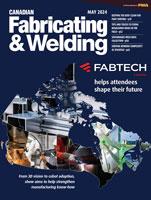Editor
- FMA
- The Fabricator
- FABTECH
- Canadian Metalworking
Effective tech implementation needs leadership
FABTECH Canada keynote stresses that advanced manufacturing isn't all about the technology
- By Rob Colman
- July 26, 2022
FABTECH Canada was just finishing when I sat down to write this editorial. It was great to be back at the Toronto Congress Centre seeing the newest technologies and listening to keynote speakers discuss the issues that are on the minds of many shop owners.
It was also interesting to ponder what has changed in the four years since the last show. Jayson Myers, CEO of NGen, noted that not all that long ago AI and machine learning were very new concepts and at the bleeding edge of the technology curve. At this show, the technology certainly wasn’t run-of-the-mill, but it had become a standard part of manufacturing solutions.
Myers stressed during his keynote that leadership in advanced manufacturing is not just about technology or the data it can generate; it’s about how businesses can profitably use those technologies and data to achieve their business objectives. This sounds self-evident, but when faced with the latest technology that everyone says will be a game-changer, it can be tempting to invest first and work out how to integrate it later. Sometimes implementing new technology requires finding new team members or training existing team members with the right skill set to make it work most effectively.
Myers’ point was that technology can only get you so far. You also need strategic leadership, people management skills, and processes that are themselves world-class. These abilities will help you choose your technology well and assist in its implementation.
He also noted how customer relationships are shifting, pointing to a greater demand for manufacturers to be problem solvers for their customers; it’s about being a “solution provider” rather than simply delivering parts to the customer. This should inform technology use as well. For instance, what data will be useful in driving value for the customer? A good example of this is how some ERP systems allow customers to view the progress of their order in real time. This sort of transparency, depending on what market you serve, can be important. Ultimately, success rests on creating a lasting relationship with customers, and what that involves has shifted as technology has made it possible for the customer to demand more.
The critical point Myers makes is that technology is just a piece of the puzzle. If your shop is already using lean processes, it’s this sort of approach to step-by-step improvements that will help you best figure out future investments in paradigm-shifting tech. Use your management skills and your team building abilities to maintain good communication, and as a team you will figure out the best next steps.
subscribe now


Keep up to date with the latest news, events, and technology for all things metal from our pair of monthly magazines written specifically for Canadian manufacturers!
Start Your Free SubscriptionAbout the Author

Rob Colman
1154 Warden Avenue
Toronto, M1R 0A1 Canada
905-235-0471
Robert Colman has worked as a writer and editor for more than 25 years, covering the needs of a variety of trades. He has been dedicated to the metalworking industry for the past 13 years, serving as editor for Metalworking Production & Purchasing (MP&P) and, since January 2016, the editor of Canadian Fabricating & Welding. He graduated with a B.A. degree from McGill University and a Master’s degree from UBC.
- Industry Events
Automate 2024
- May 6 - 9, 2024
- Chicago, IL
ANCA Open House
- May 7 - 8, 2024
- Wixom, MI
17th annual Joint Open House
- May 8 - 9, 2024
- Oakville and Mississauga, ON Canada
MME Saskatoon
- May 28, 2024
- Saskatoon, SK Canada
CME's Health & Safety Symposium for Manufacturers
- May 29, 2024
- Mississauga, ON Canada





















